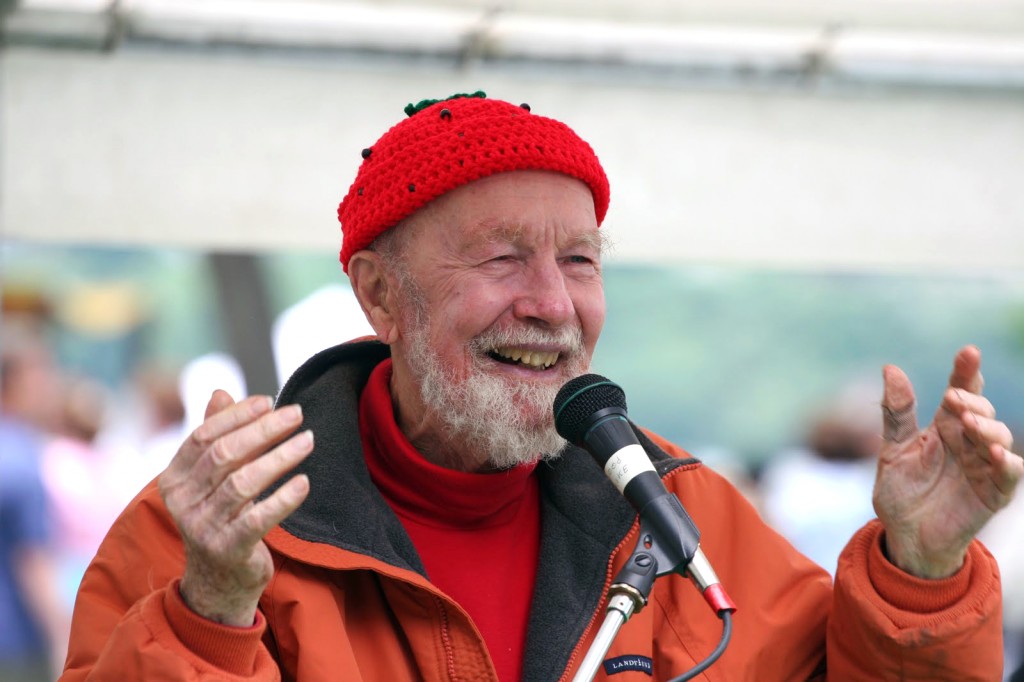
Pete Seeger’s “I Had a Rooster” was one of the first songs my mother ever sang to me. By this time, Seeger had already lived most of his life, and he was already saying at his concerts, “Well, this will be the last time …” Now, the bright-eyed kid listening to Seeger from her car seat is a college sophomore, and on Tuesday, Seeger’s life ended after 94 years.
A life that lasts almost a century is something to be celebrated, but it is still hard to let go of someone who brought hope through his music to so many generations. My grandfather remembers hearing him play “If I Had a Hammer” with the Weavers on the radio. My mother remembers going with her summer camp to see him on the Hudson when he first founded his Hudson River Sloop Clearwater organization. I remember sitting wide-eyed on my mother’s lap at his Clearwater concerts, listening intently as he animated stories with his whole body, strumming his banjo at the climaxes and cupping his hand to his ear for the audience to provide the sound effects. To this day, his music brings me back to the hopeful outlook and peaceful image of the world that I began my life with. He had a way of singing about peace that made it sound so simple and obvious.
Seeger was first on the radio in the 1940s and later in the ’50s with the Weavers. Songs like “Where Have all the Flowers Gone?,” “If I Had a Hammer” and “Turn! Turn! Turn!” are ingrained into American culture and have influenced a huge array of musicians and songwriters. For Seeger, music had the power to spark change, and he used it toward this purpose throughout his life. As much as he was a folk singer, he was an activist, and his efforts ranged from anti-war causes to civil rights to the environment. He held firmly to his beliefs, never budging on matters of justice and morality. When he was blacklisted during the McCarthy era and even when he faced 10 years of jail time, he held to his principles and refused to forgo his rights in order to testify. He has also been involved with environmental activism, and his Clearwater organization has been fighting pollution in the Hudson since 1966. His music was his primary method of bringing attention to his causes.
Examples of his musical influence are so numerous that it is the assumed backdrop to all folk music that followed. His relationship to Woody and Arlo Guthrie is well-known, and he played with both of them at different points in his life. He was responsible for popularizing the five-string banjo and bringing back its role in American music. He led the 1960s urban folk-revival, which centered on music as a tool for social reform. He helped kickstart Bob Dylan’s career. Today, his songs are staples of the American folk music tradition, and even those too young to know of him can sing along to his songs.
The last time I saw Seeger was at his 90th birthday Clearwater concert at Madison Square Garden, just over four years ago. While his voice weathered, he stood tall and proud, leading the stadium through “We Shall Overcome.” Among the musicians who came out to pay tribute were Arlo Guthrie, Emmylou Harris, Joan Baez, Tom Paxton, Bruce Springsteen and Dave Matthews. Even in a packed Madison Square Garden, it still felt like he was singing just to me. Seeger has seen more years of hardship and atrocity than just about anyone in U.S. history, and yet his expression still beamed with his unwavering optimism. There is simply no musician today who parallels Pete Seeger’s unfaltering moral compass, dedication to activism and belief in the power of music to bring change. Seeger brings up the feeling of childhood to everyone — not just because of the grandfatherly joy that he sang with, but because he never lost hold of the child’s simple assumption that that the world is capable of goodness and peace.


